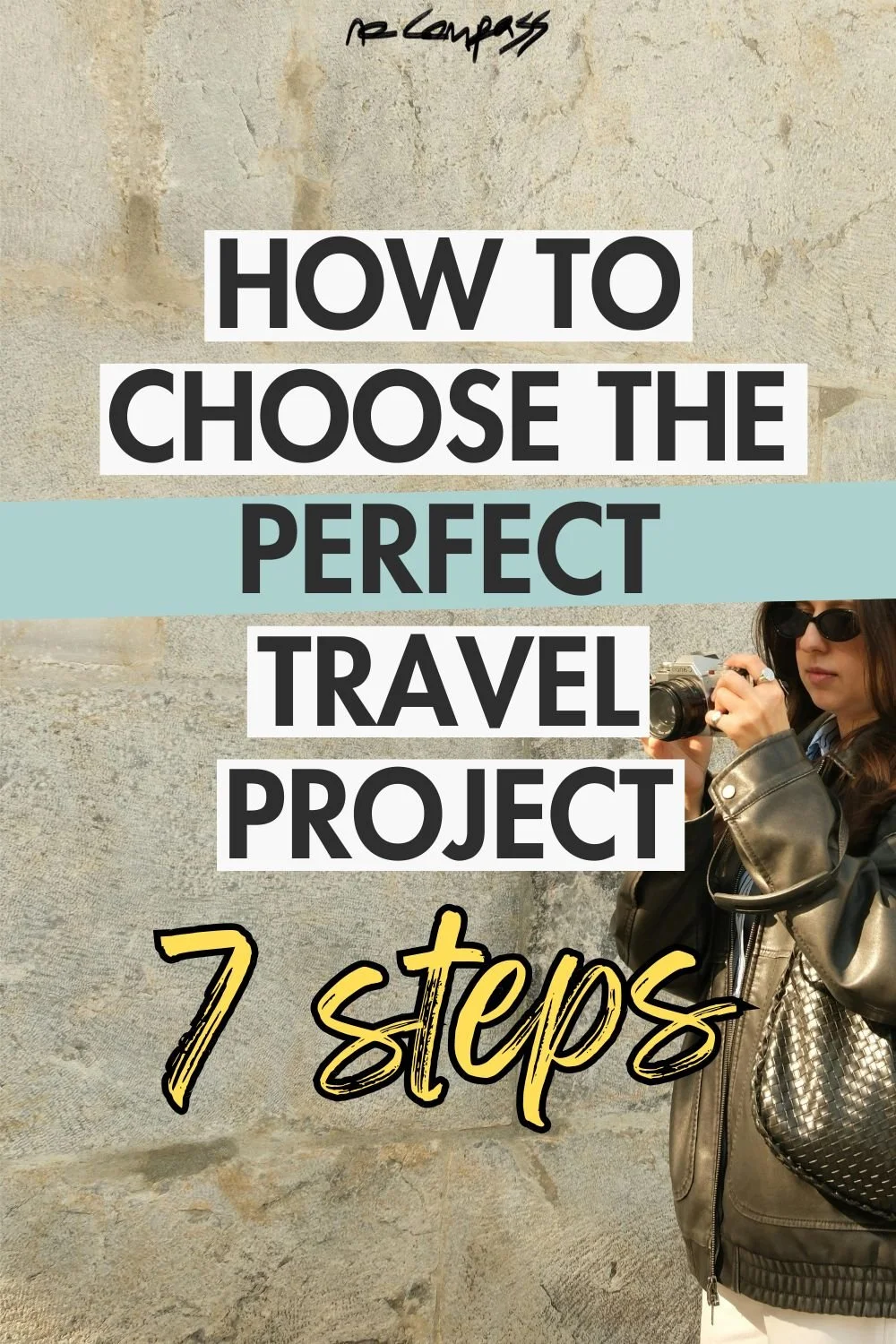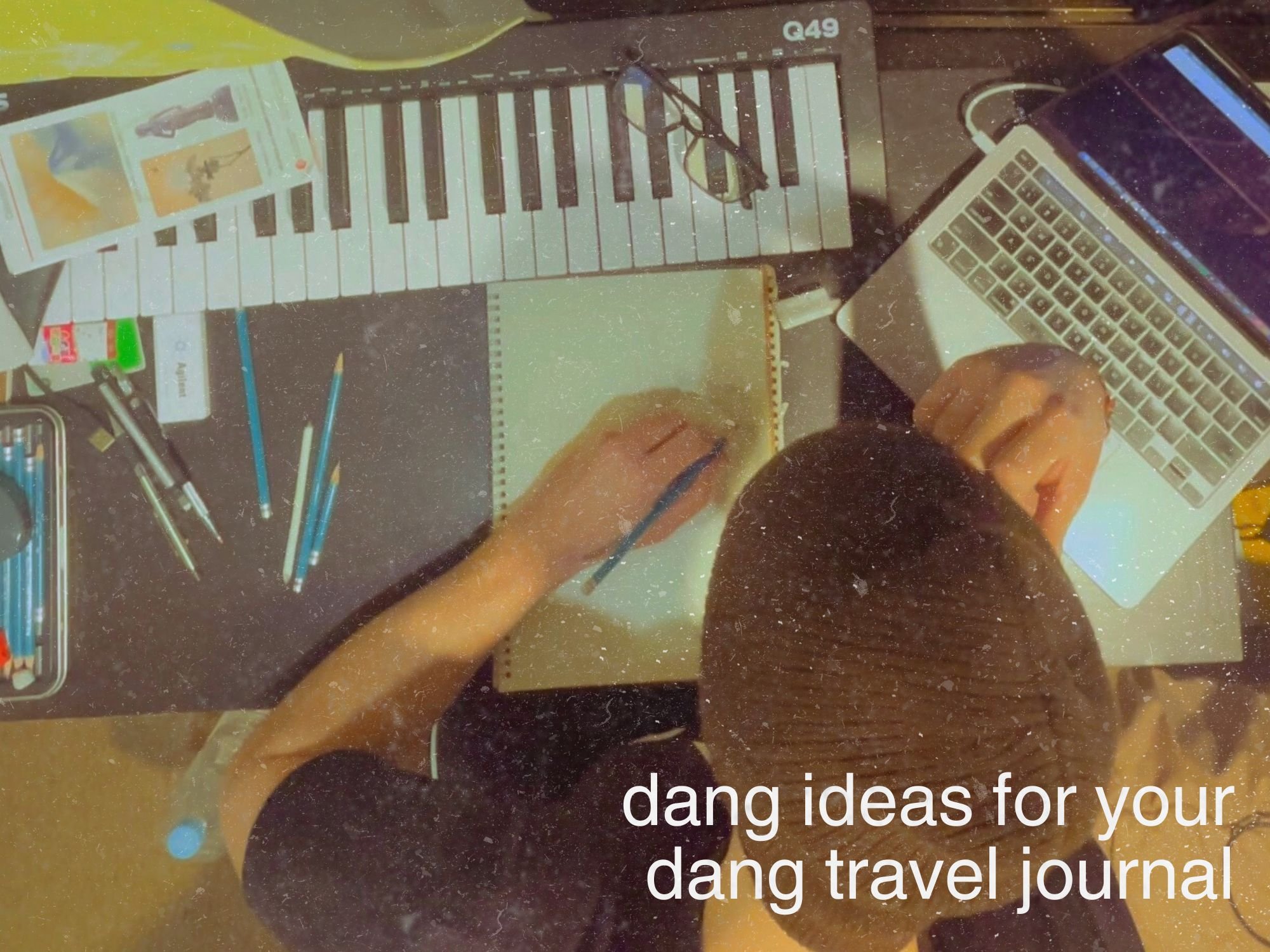Have Travel Projects (7 steps to traveling with a purpose)
I mean, why NOT travel like an artist?
Don’t forget to pin this post for later!
I have a philosophy about traveling: it’s a great creative act. Because pushing into the unknown and discovering new perspectives always leads to more imagination and fresh ideas.
When I go abroad, I like to set a travel intention (a travel purpose). And my favorite way to do this is by having creative travel projects.
Travel projects make the adventure more engaging, purposeful, meaningful and artistic.
And fun.
I mean, there’s nothing wrong with leisure travel or doing nothing (I recommend it even). But if you’re like me (you like to make stuff), then projects are an epic way to elevate your trips abroad.
This is my guide on how to travel with more purpose by having engaging creative travel projects.
Let’s get to it!
Table of Contents
So, What Exactly Is A Travel Project?
A travel project is some creative task or goal to turn your travel experience into some artistic human thing.
For example, making a short travel film with your phone, creating a travel sketchbook, starting a travel blog, writing a novel and even just travel journaling are all epic project ideas.
Ultimately though, anything goes. Because anything can be a creative project.
Let’s keep moving and look at why travel projects kick ass.
So Why Should I?
Make travel more creative
Add more intention to your adventures
Projects distract you from stressful travel stuff
Projects make solo travel more fun and engaging
It’s a form of self expression and boosts your self awareness
It’s a sense of accomplishment and a source of personal pride
Projects can be turned into content, which builds personal brand
It’s a way to connect with cultures in a deeper, more immersive way
How to Create Travel Projects (7 steps)
1. Start With You
Successful travel projects start with you.
For example, some people may be inspired by the prospect of making travel videos. But others may find this boring or even stressful.
So aligning your purpose and projects with you is an important first step.
It’s also helpful to remember that there is no “better” travel project and no right or wrong purpose for traveling. Because if knitting hats using yarn from around the world is your thing, then that’s epic — get it!
It’s all about doing things that resonate with you.
So, enter self reflection.
For me, (travel) self reflection means three core things:
What do you like to do?
What are you good at?
What are your values?
Successful and sustainable travel projects combine your existing passions, skills and value system.
For example, I love making music and writing. I’m confident at making melodies and doing SEO. And some of my core values are creativity, carefreeness, autonomy and authenticity.
So my travel projects tend to incorporate these themes (hence this blog and my music).
(if you’re not sure what your personal values are, try out this free test at personalvalu.es!)
2. Choose One Thing
After some self awareness work, you’ll have clarity about what you could do for your travel project.
So now it’s time to focus on something. Aka, choose one thing to work on. This is especially important if you’re like me and tend to have multiple passions.
For example, my first travel projects failed simply because I tried to do too much.
I wanted to make travel films, create travel-inspired music to use in those films, turn those adventures into blog posts and then create original artwork capturing each project.
Good stuff — but this proved to be way too much to tackle all in one go.
Naturally, I quickly became overwhelmed, discouraged and lost motivation.
So for your travel purpose and project, focus on just one thing. Start there and build off of that once it’s done.
3. Give Your Project A Specific Goal
Your travel project (and purpose) likes to have some direction. A travel goal can help here.
Your travel purpose and project are already almost a goal. But this step will make things more specify and detailed.
For example, if your project is to make a travel video, now is the time to dial in on some details. How long will it be? What style do you envision it being? How do you plan on using this project?
And what’s your timeline for completing this travel project?
Get clear about what you want from your travel project and purpose. It can help to use the S.M.A.R.T. goal framework here:
Specific
Measurable
Achieveable
Relevant
Time-bound
Whether your goals are big or small, just make them clear.
Explore more:
➤ Epic Travel Goals to Try
4. Make A Plan
Once you know what you want to do with your creative projects, it’s time to make a plan for how you’ll reach that goal.
Organizing goals makes them much easier to reach. And my favorite method is to reverse engineer them.
Here’s how:
Define your main macro goal (from step three above)
Break down your macro goal into micro goals
Break down each micro goal into nano goals
Typically, my nano goals are smaller, daily tasks to complete, while micro goals are weekly or monthly targets.
For travel projects, this timeline may look different, but the same idea applies.
Your plan is your map with instructions. It’s strategic and shows you what to focus on and when to focus on it.
Although, while you map things out, you may discover some bottlenecks.
So let’s keep going.
5. Address Bottlenecks
Bottlenecks are things that prevent you from working on or reaching your goals.
These things can be personal or external. And it super helpful to identify them so you can either avoid them or create solutions to them for when they pop up.
For example, here are some potential creative travel project bottlenecks:
Skill gaps
Not enough time
Low motivation
Resources or tools
Weather
Poor planning
A less-than-ideal destination for your project
Money constraints
A lack of vision or clarity for your project
After identifying bottlenecks, I like to either fix them, avoid them or create workaround solutions for when they pop up.
Avoiding bottlenecks keeps me consistent and having fun.
6. Give Your Projects A Home
Technically, this last step is optional — but I say, why not share your stuff with us?
Giving your projects a home makes them content. This means turning your creations into videos, blogs, podcasts or other pieces of content for public digital consumption.
This makes you a content creator and builds your personal brand. And it’s fun.
When it comes to choosing a home for your projects, my best advice is to choose a platform that lets you be your most authentic self.
Just remember, you don’t need to be everywhere or follow any rules — just have fun and keep creating.
7. Expand (and never stop)
What good is a creative travel project if it’s just one and done?
I say, if you’re serious about this (and love the idea of elevating travels with creativity), then don’t stop after your first travel project.
Expand on it.
Have a follow-up, try something new, improve next time. You could even turn this passion into a full brand (that’s pretty much how this blog started).
So have fun with it and welcome to your new creative lifestyle.
Later ✌️
Your travel purpose adds intention to your adventures. It’s also a fun way to travel alone.
Creative travel projects are best when they represent your passions, core values and goals. From there, it’s about having a plan and addressing any bottlenecks.
I also like to turn my projects into content and share them. This builds my personal brand, which has a whole list of secondary benefits. But let’s save that discussion for another day.
So with that, happy travels…now go make something cool.
Want More? Nice. Here’s More.





